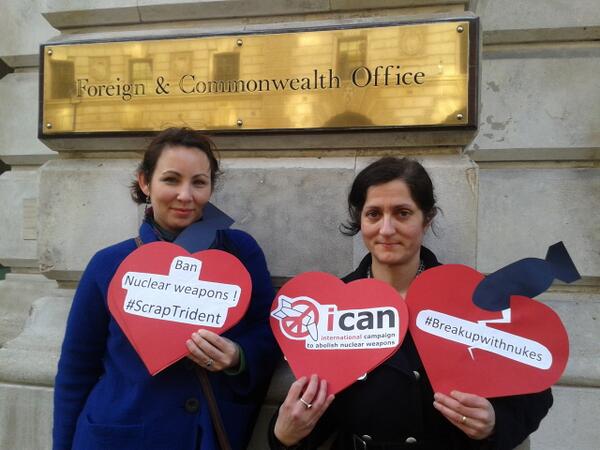Dear Friends, [Alice Slater writes]
There’s no doubt that the ICAN campaign and the humanitarian initiative which started in Norway, and then went on to Mexico and Austria has shaken things up at the NPT. There’s a new impatience with the nuclear weapons states’ commitment to a “step by step” approach to nuclear disarmament on a never ending treadmill stairway that leads nowhere. Indeed the US announcement of its intention to spend one trillion over the next THIRTY years for new bomb factories, delivery systems and nuclear bombs is obscene and indicates a total lack of good faith to honor its NPT promise for nuclear disarmament. Other nuclear weapons states are also “modernizing” their arsenals.
That’s why the Austrian initiative to gather nations on a pledge “to fill the legal gap” and let the non-nuclear weapons states take the lead in banning the bomb is so promising. As of today, thanks to campaigners all over the world and at the NPT in New York, 91 countries have signed the Austrian pledge with one more week to go till the NPT ends this Friday. See,www.icanw.org/pledge The next big gathering will be the 70th Anniversary of the catastrophic bombings of Hiroshima and Nagasaki this August 6th and 9th in Japan. Then the world will surely be impatient to move forward to fill the legal gap with a ban treaty. See the extraordinary speech given by South Africa this week, below, calling the nuclear weapons states to account for holding the world hostage for their “security” that selfishly serves to put everyone else on the planet as well as all life on earth itself, at risk of nuclear catastrophe! Regards, Alice
PLUS
Dear Elizabeth,
Thank you for the very useful paper on the under-representation of lower income countries in multi-lateral nuclear disarmament forums.
This has been a concern for us from the Pacific region for a long time.
Most Pacific Island governments (and civil society) are strongly opposed to nuclear weapons and have taken leadership in various initiatives. These include campaigns against nuclear testing, making the South Pacific a nuclear weapon free zone and taking the lead on a number of actions in the International Court of Justice against nuclear tests (1972 and 1995 cases), the threat or use of nuclear weapons (1996) and most recently on the lack of implementation of the nuclear disarmament obligation (lodged by the Marshall Islands).
However, low incomes in the Pacific and the exorbitant costs of travel from there to the northern hemisphere (where all the UN and disarmament bodies are) make it impossible for Pacific Island countries to participate in all the meetings.
One option is to take some of the meetings to the south.
Abolition 2000, the global network to eliminate nuclear weapons, held its 2007 assembly in Te Ao Maohi (French Polynesia) which proved an excellent opportunity to engage with Pacific civil society. New Zealand hosted a regional UN disarmament conference in 2001 which provided an opportunity to engage with governments and experts. More regional meetings could be useful.
Another option is to engage more through video-conferencing, webinars and cooperative actions in multiple locations not requiring long-distance travel. Global Wave 2015, for example, engaged civil society all around the world in the 2015 NPT Review conference, facilitating action in their own locations and feeding this into the NPT Review Conference through social media and representative events (events in NY with small number of people, but representing many organisations). Indeed, with the oceans already washing over many of our islands due to climate change, we have to limit our carbon footprint. Long distance air travel is one of the biggest contributors to this. See the Guardian article Losing paradise: the people displaced by atomic bombs, and now climate change, for a sobering report on this existential threat to Pacific Islands for a sobering report on the existential threat from climate change.
Finally, it is very important for those in the North to support nuclear disarmament initiatives from the south. It is very disappointing that there has been very little support for the Marshall Islands case in the International Court of Justice. All NPT member States have been informed by the Court that they have the right to intervene, as the case relates to the NPT. None so far have done so. The excuse by some from the North is that Marshall islands has not been active enough in the NPT and other UN forums, and so they question if Marshall islands is serious about the initiative!!!! This is a very lame excuse as Marshall Islands does not have the money or people to cover all the UN meetings. I wonder whether campaigners are pushing their governments to take up the invitation to intervene in the case?
Thanks again for your very useful report.
Alyn
*****
[ICAN] New paper on underrepresentation of low income countries
Hi all
Article 36 released a paper today on the underrepresentation of low income and non-western countries in nuclear disarmament forums.
As many of us know or suspect, lower income countries are less likely to send representatives, will send smaller delegations and will speak less in these multilateral discussions.
The paper lays out the data on this, looking at the NPT, Humanitarian Impact conferences, CTBT meetings and the CD – the results are quite striking. For example, in the information that was available, the percentage of low-income parties to the NPT making a statement to the main committees, clusters and specific issues was only 1% on average across all NPT meetings between 2010 and 2014.
The full paper is here:
And a digest is in today’s News in Review:
http://reachingcriticalwill.org/images/documents/Disarmament-fora/npt/NIR2015/No9.pdf
Best
Elizabeth
P.S. We will be following this paper up with qualitative research on the factors behind the trends – please be in touch if you are interested in contributing your perspectives on this.
—
Elizabeth Minor, Researcher, Article 36






